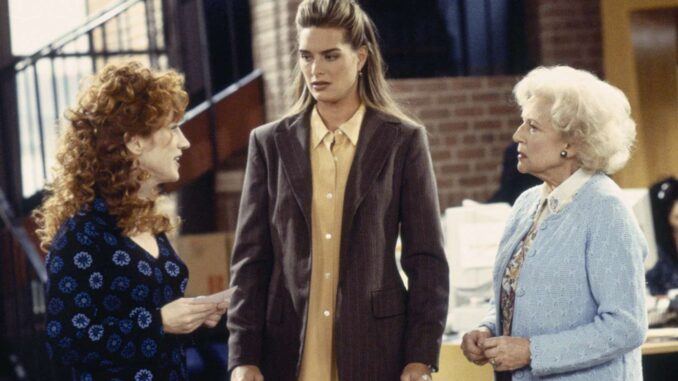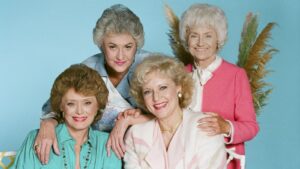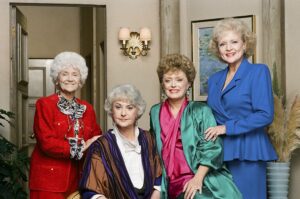
Bea Arthur, renowned for her iconic role as Dorothy Zbornak in The Golden Girls, was not only a talented actress but also a fiercely opinionated advocate for quality in comedy. Her strong personality and commitment to the craft of acting led her to make some bold decisions during the production of the beloved sitcom. One significant moment in the show’s history involved her outspoken criticism of a director, highlighting her belief that a comedy director should possess a solid sense of humor.
The Legacy of The Golden Girls
The Golden Girls premiered in 1985 and quickly became a cultural phenomenon. The show, which revolved around four older women sharing a house in Miami, tackled various social issues while delivering sharp wit and humor. Its success can be attributed not only to the talented cast—comprising Bea Arthur, Betty White, Rue McClanahan, and Estelle Getty—but also to its exceptional writing and direction. The series won numerous awards and remains a beloved classic, often praised for its groundbreaking portrayal of older women.
Bea Arthur: A Comedy Icon
Bea Arthur’s portrayal of Dorothy was characterized by her quick wit, intelligence, and no-nonsense attitude. She brought depth to her character, making Dorothy both relatable and memorable. Arthur’s background in theater and her experience in comedy equipped her with a unique perspective on what worked—and what didn’t—in the realm of comedic performance.

Arthur was known for her straightforwardness, and this trait extended to her interactions with the show’s production team. Her dedication to the quality of the series meant that she was not afraid to voice her concerns, especially when it came to maintaining the comedic integrity of the show.
The Director in Question
During the production of The Golden Girls, there was a particular director whose style didn’t quite resonate with Arthur. While she appreciated the contributions of many directors who worked on the show, she felt that one specific individual lacked the comedic sensibility necessary for a series that thrived on humor.
Arthur famously questioned, “Shouldn’t a comedy director be funny?” This statement underscored her belief that those in charge of directing comedic scenes should have an innate understanding of timing, delivery, and the nuances that make humor effective. For Arthur, comedy was not just about the written word; it was about how those words were brought to life through performance and direction.
The Importance of Comedy Direction
The role of a director in a comedy series is multifaceted. A director is responsible for interpreting the script, guiding actors, and shaping the overall tone of the show. In a sitcom like The Golden Girls, where humor is often derived from character interactions and timing, the director’s vision is crucial. Missteps in direction can lead to missed jokes, awkward pacing, and a diminished comedic effect.
Arthur’s insistence on having directors who understood comedy reflects a broader truth in the entertainment industry: the best creative outcomes often arise when all team members share a common understanding of the project’s goals. In the realm of comedy, this means directors must be able to recognize what makes a scene funny and how to elicit the best performances from their actors.
Impact on The Golden Girls

Arthur’s willingness to speak out about directorial choices had a significant impact on the production of The Golden Girls. Her advocacy for quality helped ensure that the show maintained its high standards throughout its run. This commitment to excellence contributed to the show’s enduring success and left a lasting legacy.
The strong chemistry among the main cast, combined with the influence of directors who understood the comedic tone of the show, resulted in unforgettable moments that continue to resonate with audiences today. Episodes filled with sharp dialogue and heartfelt moments remain timeless, a testament to the collaborative nature of the series.
A Lasting Influence
Bea Arthur’s influence extended beyond her role in The Golden Girls. Her career in theater and television showcased her commitment to the craft of acting and her belief in the importance of strong direction in comedy. Her willingness to speak out for what she believed in serves as an inspiration for actors and creators in the industry today.
The legacy of The Golden Girls continues to thrive, thanks in part to the strong foundations laid by Arthur and her co-stars. The show has inspired countless spin-offs, merchandise, and even a resurgence of interest in the stories of older women in media. Arthur’s dedication to ensuring that comedy was handled with care and expertise remains a guiding principle for future generations of creators.
Conclusion: The Art of Comedy
Bea Arthur’s candid assessment of what constitutes effective comedy direction highlights the importance of collaboration and understanding within the creative process. Her question, “Shouldn’t a comedy director be funny?” serves as a reminder that humor is an art form that requires not just talent but also a deep comprehension of timing and character dynamics.
As audiences continue to celebrate The Golden Girls, they also honor the legacy of Bea Arthur and her commitment to excellence in comedy. Her impact on the show and the industry at large is a testament to the role of strong voices in shaping the narratives we cherish. In a world where comedy continues to evolve, Arthur’s insights remain relevant, reminding us that laughter is best delivered with intention, skill, and a touch of genuine humor.
